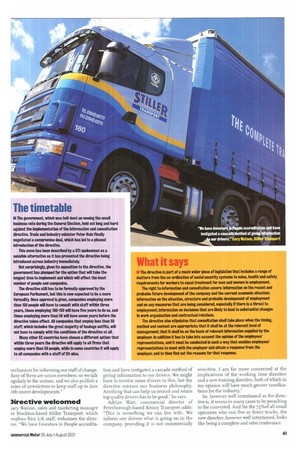The timetable
Page 41

If you've noticed an error in this article please click here to report it so we can fix it.
• The government, which was hell-bent on wooing the small business vote during the General Election, held out long and hard against the Implementation of the information and consultation directive. Trade and Industry minister Peter Hain finally negotiated a compromise deal, which has led to a phased introduction of the directive.
This move has been described by a DTI spokesman as a sensible alternative as it has prevented the directive being introduced across industry immediately.
Not surprisingly, given its opposition to the directive, the government has plumped for the option that will take the longest time to implement and which will affect the least number of people and companies.
The directive still has to be formally approved by the European Parliament, but this is now expected to be a mere formality. Once approval is given, companies employing more than 150 people will have to consult with staff within three years, those employing 100-150 will have five years to do so, and those employing more than 50 will have seven years before the directive takes effect. All companies that employ less than 50 staff, which includes the great majority of haulage outfits, will not have to comply with the conditions of the directive at all.
Many other EC countries have chosen a different option: that within three years the directive will apply to all firms that employ more than 50 people, while in some countries it will apply to all companies with a staff of 20-plus.




















































































































